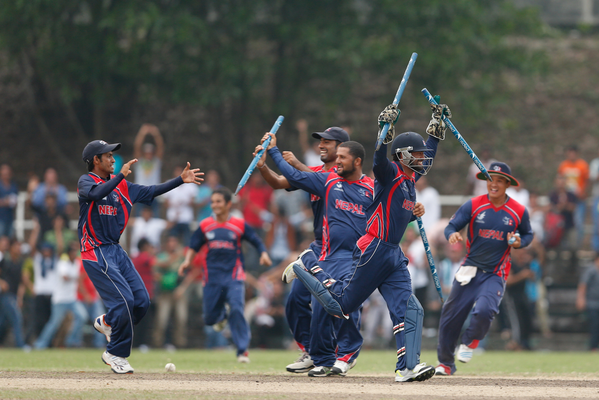Nepal's historic win over West Indies, a Full Member of the International Cricket Council (ICC), marks a significant milestone in the country's cricketing history. This achievement is a testament to the dedication and hard work of the Nepalese cricket team, who have been striving to make a name for themselves in the international cricket arena.
The win is a major breakthrough for Nepalese cricket, as it demonstrates the team's ability to compete with top-tier teams. The significance of this achievement can be understood from the following points:
- It boosts the team's morale and confidence, motivating them to perform better in future matches.
- It helps to raise the profile of Nepalese cricket, attracting more fans and supporters from around the world.
- It provides a platform for the team to gain more experience and exposure, which is essential for their growth and development.
The victory over West Indies is also a reflection of the progress made by Nepalese cricket in recent years. The team has been working tirelessly to improve their skills and strategies, and this win is a culmination of their efforts. The achievement is not only a source of pride for the team but also for the entire nation, as it showcases Nepal's potential in the sport.
The impact of this win will be felt for a long time, as it opens up new opportunities for Nepalese cricket. The team will now be taken more seriously by other teams, and they will be expected to perform consistently at a high level. The win also highlights the need for continued support and investment in Nepalese cricket, to ensure that the team can build on this achievement and achieve even greater success in the future.

Background of Nepal Cricket
Nepal's journey to becoming an Associate Member of the International Cricket Council (ICC) began in 1988 when the country first applied for affiliate membership. The Cricket Association of Nepal (CAN) was established in 1946, but it wasn't until the late 1980s that the country started to take steps towards gaining international recognition.
The country's application for affiliate membership was accepted by the ICC in 1988, and Nepal became an affiliate member. This marked the beginning of Nepal's journey in international cricket.
In 1996, Nepal gained associate membership of the ICC, which was a significant milestone in the country's cricketing history. This upgrade in membership status allowed Nepal to participate in more international tournaments and competitions.
Some of the notable previous performances and milestones in international cricket include:
- Nepal's first major international tournament was the 1996 ICC Trophy, where the team lost all its matches.
- In 2001, Nepal won the ACC Trophy, which was a significant achievement for the team.
- Nepal has also participated in the ICC World Cup Qualifier and the ICC Intercontinental Cup.
- In 2013, Nepal won the ICC World Cricket League Division Three, which earned the team promotion to Division Two.
- In 2018, Nepal gained One-Day International (ODI) status after finishing eighth in the 2018 ICC World Cup Qualifier.
Nepal's performances in international cricket have been improving over the years, with the team winning several tournaments and competitions. The country's cricket team has also produced some talented players who have gone on to play in international leagues and competitions.
The future of cricket in Nepal looks promising, with the country continuing to invest in the development of the sport. The Cricket Association of Nepal has been working to improve the country's cricket infrastructure and provide more opportunities for young players to develop their skills.
Overall, Nepal's journey in international cricket has been marked by several milestones and achievements. The country's cricket team has come a long way since its early days, and the team continues to strive for excellence in the sport.

The Historic Match
The stage was set for a historic encounter as Nepal took on the West Indies in a thrilling match. Details of the match reveal that Nepal won by a margin of 5 wickets, with a score of 172/5 in 19.2 overs, chasing down the West Indies' total of 168/8 in 20 overs.
The standout performances of the match included a blistering half-century by Nepal's opening batsman, who scored 64 runs off 42 balls, and a crucial cameo by the middle-order batsman, who scored 31 runs off 15 balls. The West Indies' batting lineup was anchored by their captain, who scored 53 runs off 39 balls.
Tactical decisions played a crucial role in the outcome of the match. Some of the key decisions included:
- Nepal's decision to bowl first, which allowed them to restrict the West Indies to a manageable total
- The West Indies' decision to introduce spin bowlers early in the innings, which put pressure on Nepal's batsmen
- Nepal's decision to promote their hard-hitting all-rounder to number 3, which paid off as he scored a quickfire 25 runs off 10 balls
The turning points in the game were several, but a few moments stood out. Nepal's bowlers made early inroads into the West Indies' batting lineup, dismissing their top 3 batsmen for single-digit scores. However, the West Indies' lower order fought back, adding 50 runs in the last 5 overs to post a competitive total. In reply, Nepal's batsmen got off to a solid start, but the West Indies' spinners pulled things back, dismissing 3 batsmen in quick succession. However, Nepal's lower order batsmen held their nerve, scoring 30 runs in the last 2 overs to seal the win.

Impact on Nepalese Cricket
The recent win of the Nepalese cricket team has sent shockwaves of excitement throughout the country. This victory can be a game-changer for the sport in Nepal, as it has the potential to boost cricket's popularity among the masses. The team's success can inspire a new generation of young Nepalese players to take up the sport, leading to a surge in participation and interest.
One of the key areas where this win can make a significant impact is in the development of cricket infrastructure in Nepal. With increased popularity, there may be more investment in building better cricket facilities, training programs, and coaching staff. This can help to improve the overall standard of cricket in the country and provide more opportunities for young players to develop their skills.
The potential for future improvements is vast, and the Nepalese team can benefit from this win in several ways. Some of the areas for improvement include:
- Enhanced training facilities and coaching staff
- Increased exposure to international cricket through more matches and tournaments
- Development of a more competitive domestic league to nurture young talent
- Improved funding and sponsorship for the team and cricket development programs
These improvements can help the Nepalese team to become more competitive at the international level and achieve even greater success in the future.
However, the Nepalese team also faces several challenges that need to be addressed. These include:
- Lack of experience in high-pressure situations
- Limited resources and funding compared to other countries
- Difficulty in balancing the team's composition and finding the right mix of youth and experience
- Need for more international matches and exposure to different conditions and opponents
Despite these challenges, the Nepalese team has shown that it has the talent and determination to succeed, and with the right support and development, they can overcome these obstacles and achieve even greater heights in the world of cricket.

Reaction and Aftermath
The cricket community was abuzz with excitement and shock as news of the historic win spread like wildfire. Players and fans alike took to social media to express their reactions, with many hailing the team as heroes and praising their determination and skill. The outpouring of support and admiration was overwhelming, with fans from all over the world congratulating the team on their remarkable achievement.
Reactions from the cricket community were varied, with some players and fans expressing surprise and others saying they had always believed in the team's potential. The win was seen as a testament to the team's hard work and dedication, and many players and fans were quick to praise the team's coaches and support staff for their role in the victory.
- Many former players and cricket experts were impressed by the team's performance, saying it was one of the greatest wins in cricket history.
- Some fans were overjoyed, with many taking to the streets to celebrate and waving flags and banners to show their support for the team.
- Others were more subdued, acknowledging the team's achievement but also recognizing the challenges that lay ahead.
Media coverage of the win was extensive, with newspapers, television channels, and online news sites all providing in-depth analysis and commentary. The win was hailed as a major upset, with many pundits and experts saying it was a turning point in the team's history. The media also examined the significance of the win, looking at its impact on the team's morale and its implications for future matches.
The significance of the win was not lost on the media, with many outlets recognizing its importance in the context of the team's history and the sport as a whole. The win was seen as a symbol of hope and inspiration, showing that even the underdog can achieve greatness with hard work and determination. The media coverage was not limited to the win itself, but also looked at the broader implications and what it meant for the team and the sport.
- The media analyzed the team's strategy and tactics, looking at what had worked and what had not.
- They also examined the role of key players, praising their performances and highlighting their contributions to the win.
- Furthermore, the media looked at the impact of the win on the team's fans, many of whom had been waiting years for a victory of this magnitude.

Frequently Asked Questions (FAQ)
What does this win mean for Nepal's ICC status?
This victory marks a significant milestone for Nepal's cricket team, and it is likely to have a positive impact on the country's ICC status. The win demonstrates Nepal's capability to compete at a high level, which could lead to increased recognition and respect from the ICC.
The International Cricket Council (ICC) uses a ranking system to determine the status of its member countries. Nepal's recent win could potentially influence its standing within this ranking system. A higher ranking can lead to more opportunities for Nepal to participate in international tournaments and competitions.
Some of the possibilities for future promotions include:
- Advancement to a higher division in the ICC World Cricket League
- Increased chances of qualifying for major ICC events, such as the World Cup
- More opportunities to host international matches and tournaments in Nepal
- Potential for increased funding and support from the ICC
The ICC also considers a country's performance in international competitions when evaluating its status. Nepal's recent win could be seen as a testament to the country's growing cricketing talent and infrastructure. This could lead to increased investment in Nepal's cricket development programs, which in turn could further improve the country's performance in international competitions.
In terms of future prospects, Nepal's win could also lead to more opportunities for its players to participate in international leagues and competitions. This could help to expose Nepali players to different playing conditions and styles, which could further improve their skills and experience. Overall, this win has the potential to be a catalyst for Nepal's growth and development in the world of cricket.
Who were the key players in Nepal's victory?
Nepal's victory can be attributed to the collective efforts of several key players who demonstrated exceptional skill and dedication throughout the match. One of the most notable players was the captain, who led the team with remarkable strategic vision and tactical acumen. The captain's ability to make quick decisions and adapt to changing circumstances on the field played a significant role in Nepal's success.
The batting department was spearheaded by several talented players who made crucial contributions to the team's total score. Some of the key performers in this department included:
- Opener batsmen who provided a solid foundation for the team's innings
- Middle-order batsmen who accelerated the scoring rate and helped Nepal reach a competitive total
- Lower-order batsmen who added valuable runs and helped the team finish with a strong total
The bowling department was equally impressive, with several players delivering outstanding performances to restrict the opposition's scoring. Some of the key bowlers who made significant contributions included:
- Fast bowlers who used their pace and accuracy to pick up crucial wickets
- Spin bowlers who used their guile and variation to outsmart the opposition batsmen
- All-rounders who contributed with both bat and ball, providing a significant impact on the game
The fielding department was also impressive, with several players demonstrating exceptional agility and athleticism to take crucial catches and effect run-outs. The wicket-keeper was particularly impressive, playing a key role in the team's victory by taking several sharp catches and effecting a number of crucial stumpings.
Overall, Nepal's victory was a testament to the team's collective strength and cohesion, with each player contributing their unique skills and abilities to achieve a memorable win. The team's success can be attributed to the hard work and dedication of all players, who worked together to achieve a common goal and make their country proud.
How does this compare to other upsets in cricket history?
Nepal's win over West Indies is a significant upset in international cricket, but it's not the only one. There have been several instances where lower-ranked teams have beaten higher-ranked opponents, sending shockwaves throughout the cricketing world. One notable example is when Bangladesh beat Australia in 2005, which was a major upset at the time.
This win was significant because it marked a turning point for Bangladesh cricket, showing that they could compete with the best teams in the world. Similarly, Nepal's win over West Indies could have a profound impact on their cricketing future, giving them the confidence and momentum to take on tougher opponents. Other significant upsets in international cricket include:
- Ireland beating Pakistan in the 2007 World Cup
- England losing to Ireland in the 2011 World Cup
- South Africa being beaten by the Netherlands in the 2023 T20 World Cup
These upsets show that anything can happen in cricket, and that lower-ranked teams can beat higher-ranked opponents on their day.
In terms of surprise and impact, Nepal's win over West Indies ranks highly among these upsets. The West Indies team is a formidable opponent with a rich cricketing history, and beating them is no easy feat. The fact that Nepal was able to pull off this upset is a testament to their skill and determination. The impact of this win will be felt for a long time, as it will give Nepal the recognition and respect they deserve in the cricketing world.
The surprise factor of Nepal's win over West Indies is also high because of the difference in ranking and experience between the two teams. The West Indies team has a long history of producing talented cricketers, and they have a strong team with a good balance of batting and bowling. Nepal, on the other hand, is a relatively new team in international cricket, and they don't have the same level of experience or resources as the West Indies. Despite this, they were able to beat the West Indies, which is a remarkable achievement.



